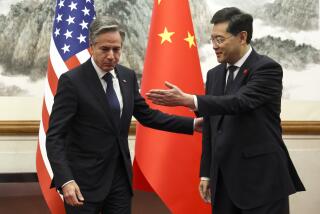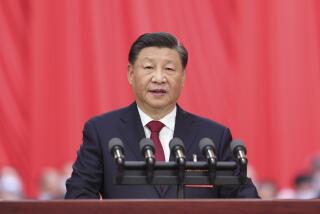Chinese Reassure Shultz on Crackdown’s Scope
- Share via
BEIJING — Secretary of State George P. Shultz said Tuesday that he has been assured by China’s top leaders that Beijing’s current crackdown on Western influences will not lead to the sort of tyranny that marked the Cultural Revolution of the 1960s and ‘70s.
Speaking at a press conference after two days of meetings with Deng Xiaoping and his top aides, Shultz said he believes that the Chinese leaders are sincere in their promise not to allow the current round of political turmoil to affect China’s foreign policy or to scuttle a decade of political and economic reform.
“The current developments should not be regarded as a return to the restrictions and repressions of the not-too-distant past,” Shultz said. “I heard a statement to the friends of China, which I am one, and the Chinese themselves who are abroad, not to equate what is happening today to particular practices of persecutions or movements of the recent past.”
He was clearly referring to the rampant human rights abuses that marked Mao Tse-tung’s Cultural Revolution and other Chinese upheavals like the anti-rightist campaign of the 1950s.
Party Chief Was Ousted
After several years of political relaxation and economic reform, China began what is officially called a campaign against “bourgeois liberalism,” the regime’s code term for Western influence and American-style democracy. Communist Party General Secretary Hu Yaobang, who was closely identified with the reforms, was ousted in January after student demonstrations in favor of greater democracy.
Despite the government’s repeated assurances that the crackdown on dissent will be held to a minimum, many Chinese students and other intellectuals have stopped talking to Western journalists for fear of being labeled “bourgeois liberals.”
U.S. officials believe that the Beijing government hopes to minimize the impact of the upheaval because it does not want to discourage U.S. trade and investment. American firms have invested more than $1.5 billion in China, a level exceeded only by companies from the enclaves of Hong Kong and Macao. More than 10% of China’s exports go to the United States.
Some U.S. officials admit privately that they are skeptical of China’s promises to contain the turmoil. But Shultz gave no indication that he shares those doubts. He said he was told that the political upheaval “does not mark a turning away from the trends of recent years.”
Not Total Westernization
“I heard it again and again, and I have no reason to question their sincerity in saying that,” he said. He added, however, that Chinese leaders had told him that the sort of openness they intend to pursue is not “synonymous with total Westernization. . . . China will not simply replicate the West any more than it will replicate the Soviet Union.”
Shultz also indicated to reporters that he failed to persuade China to stop selling arms to Iran. He said he told China that all countries should deny arms to the Tehran regime despite recent U.S. sales.
“The response I got was that we could expect China to proceed as it had before,” Shultz said.
Visits Port of Dalian
Between his morning meeting with Deng and his evening press conference in Beijing, Shultz flew to the northeast China port city of Dalian, one of four economic development zones that were established to attract foreign investment and business. In Dalian, Shultz visited a U.S.-aided management training center intended to turn out the leaders of Chinese government-owned enterprises.
In a speech at the center, Shultz praised China’s economic reform program, which he called a “remarkable success.” Shultz said the United States is considering relaxation of technology-transfer regulations to permit China to buy a wider range of U.S. high-technology products. But he also urged China to open its markets to more mundane U.S. exports, and he warned that unless China voluntarily restricts its textile exports to the United States, Washington might have to impose some restrictions.
More to Read
Sign up for Essential California
The most important California stories and recommendations in your inbox every morning.
You may occasionally receive promotional content from the Los Angeles Times.













